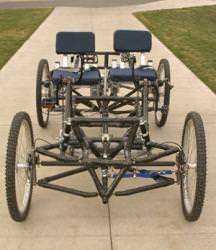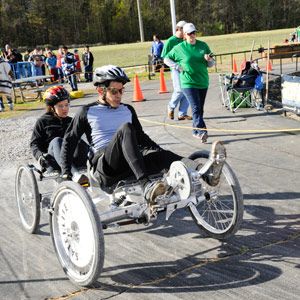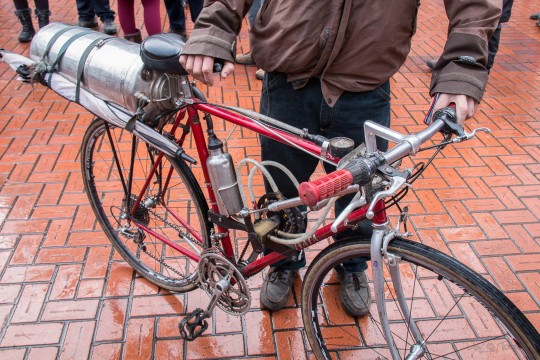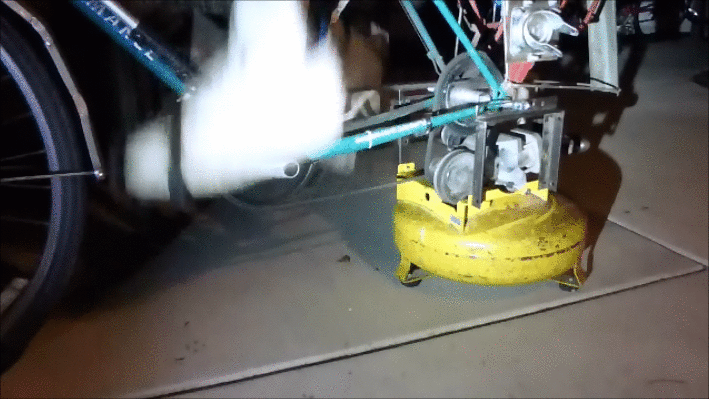New Mars Forums
You are not logged in.
- Topics: Active | Unanswered
Announcement
#126 2019-03-02 18:30:04
- tahanson43206
- Moderator
- Registered: 2018-04-27
- Posts: 24,125
Re: Bikes on Mars? - Don't laugh!
For SpaceNut ...
Thanks for the link to Mr. Swart's compilation of pedal powered vehicles of multiple kinds.
There has been discussion of pedal powered vehicles on Mars earlier in the Forum.
One comment I recall is that it would seem wearying to try to pedal a vehicle on Mars while wearing an atmosphere suit.
Your re-introduction of this topic, and a scan of the list compiled by Mr. Swart, inspires me to imagine a vehicle designed for pedal power on Mars as a BACKUP for electric motor propulsion. If the vehicle is designed to be air tight, and capable of maintaining a comfortable internal atmosphere (whatever that may be for the crew) then (perhaps) it is practical to imagine a direct drive capability from within the cabin.
Again, I am imagining this as a BACKUP, but with the lesser gravity of Mars, perhaps it is feasible to pedal a considerable distance in an emergency.
At the very least, it might be possible to pedal to the nearest recharging station, and it might be supposed that such recharging stations would be installed at reasonable intervals along roadways. There would seem to be plenty of incentive NOT to run out of juice while driving one of these vehicles out on the open surface, but if an emergency does occur, pedal power might be a solution that would appeal to an individual or group who would otherwise have to wait for help, or try to walk to shelter.
(th)
Bikes would fit well into a mars mobility base plan where you explore and do research and then mover to the next location to drop roots and explore once more.
A directory of manufacturing of 4 wheeled pedal powered bikes
it also has other wheeled combinations.
Here on Earth bikes are much safer than the fear of suit puncher would be on Mar. Then again on earth its the energy + cost factors that we see for Earth use but thats not the concern on Mars.
Offline
Like button can go here
#127 2019-03-02 19:58:47
- SpaceNut
- Administrator
- From: New Hampshire
- Registered: 2004-07-22
- Posts: 30,616
Re: Bikes on Mars? - Don't laugh!
I tend to read later from the links like that one. Something that goes with any electric battery powered motor is how to make them work.
Electric Bicycle Using a BLDC Motor
Offline
Like button can go here
#128 2019-03-02 20:22:49
- kbd512
- Administrator
- Registered: 2015-01-02
- Posts: 8,518
Re: Bikes on Mars? - Don't laugh!
SpaceNut,
I just don't see people doing this in a space suit. Electric motor bikes for rapid on-base transport? Absolutely. Pedal power? Maybe inside a large pressurized dome. We're living inside the great big shirt-sleeve biosphere we call Earth, which is the only reason it works so well. Throw on a gas mask, chemical protection suit with a blower, duct tape the rubber gloves and booties to your hands and feet, and then try to go for a ride. Let me know how that went. Then imagine what fighting to move inside the suit would be like. Maybe this could work with MCP suits, but even that is iffy. It certainly doesn't hurt to try, but I think I already know what the result will be.
Offline
Like button can go here
#129 2019-03-02 21:09:51
- SpaceNut
- Administrator
- From: New Hampshire
- Registered: 2004-07-22
- Posts: 30,616
Re: Bikes on Mars? - Don't laugh!
Lots of links on the end of this one
https://www.instructables.com/id/Engine … e-trucks-/
Nice simulated space suit but then again we will be living underground as well as in tuna cans. This would be under ground option for transport along the many miles of tunnels we will traverse.One can future dream of a mars teraformed or somewhere along the timeline...
Offline
Like button can go here
#130 2019-03-03 18:22:43
- SpaceNut
- Administrator
- From: New Hampshire
- Registered: 2004-07-22
- Posts: 30,616
Re: Bikes on Mars? - Don't laugh!
Antarctic Bike: Four Wheels For Polar Cycling
https://gearjunkie.com/4-wheel-bike-ant … an-weelden

Offline
Like button can go here
#131 2019-03-03 18:43:00
- tahanson43206
- Moderator
- Registered: 2018-04-27
- Posts: 24,125
Re: Bikes on Mars? - Don't laugh!
SpaceNut ...
Thanks for providing the link to the instructables article.
The pictures in the opening section include one that comes close to matching my concept for an enclosed vehicle for Mars.
The design shown has the distinct advantage of aerodynamic shape. For Mars the seal of the door would need to be good enough to withstand pressure to maintain a "normal" atmosphere inside the vehicle. Transmission of power to the exterior equipment (for traction and for steering) would need to be done through leakproof fittings. The mass of the vehicle would be increased due to air supply equipment, but the lesser gravity of Mars might allow for a tradeoff.
In a recent post you mentioned possible use of bicycles to move through underground tunnels, such as those I am imagining under Sagan City (2018).
That was a new idea to me, and I definitely like it. Residents would benefit by exercising during transit, for one thing.
(th)
Lots of links on the end of this one
https://www.instructables.com/id/Engine … e-trucks-/Nice simulated space suit but then again we will be living underground as well as in tuna cans. This would be under ground option for transport along the many miles of tunnels we will traverse.One can future dream of a mars teraformed or somewhere along the timeline...
Offline
Like button can go here
#132 2019-03-03 19:55:38
- SpaceNut
- Administrator
- From: New Hampshire
- Registered: 2004-07-22
- Posts: 30,616
Re: Bikes on Mars? - Don't laugh!
I was trying to describe an enclosed cabin, within which a human could operate a mechanical drive mechanism in case the primary electrical drive system failed.
This would have been a great place to have inserted an image, so I'll try to remember that in future.
My first idea was a thin walled aluminum shell, but (upon reflection) I now think that a transparent plastic bubble would enclose useful atmosphere around the operator, and provide unlimited visibility. A risk for the operator of such a vehicle would be unwanted influence of Martian winds, although I suppose a tail wind would be useful if it could be managed.
Will this do?
Internal lighting would be by LED since they are low in power use.
Offline
Like button can go here
#133 2019-03-03 21:07:37
- tahanson43206
- Moderator
- Registered: 2018-04-27
- Posts: 24,125
Re: Bikes on Mars? - Don't laugh!
For SpaceNut ...
Thanks for showing the treasure trove of images at bing.com (a) and (b) thanks for looking through that treasure trove to find such a good match for the concept I was trying to describe!
That vehicle could (hopefully) be manufactured of lightweight materials with enough strength to hold a "normal" atmosphere for a human crew. The issue of making mechanical seals good enough to hold against the internal pressure may have been solved on Earth. An example that comes to mind is the seals that allow propeller shafts to carry rotation from inside a ship to a propeller immersed in sea water.
An alternative that would avoid seals that deal with mechanical rotation altogether would be to accept human pedal power to drive a generator. The output of the generator would be fed into electric motor drive system as backup for the battery, or (if the operator just wants to participate in the activity) the output could be fed to the electric motor as a supplement to the battery.
That is exactly what is on offer to operators of a number of eBikes on Earth today. It is possible to operate from battery without pedaling, but if speed is desired and the operator has the energy to pedal, then the pedals can be engaged while the motor is running.
Your mention of LED lighting would be a good fit with the idea of operating a generator inside the cab, because the power could be delivered to services other than mobility, such as lighting (as you suggest), but as well, such as radio communications.
In a nearby post, Louis pointed out the limitations of useful operating lifetime for personal Mars suits. The enclosed cab vehicle we are discussing here would be limited in lifetime by the size of oxygen canisters and by CO2 removal supplies, but would (presumably) be designed for a lifetime up or perhaps surpassing 24 hours.
(th)
tahanson43206 wrote:I was trying to describe an enclosed cabin, within which a human could operate a mechanical drive mechanism in case the primary electrical drive system failed.
Will this do?
https://tse1.mm.bing.net/th?id=OIP.W6i4 … d=3.1&rm=2
Internal lighting would be by LED since they are low in power use.
Offline
Like button can go here
#134 2019-03-03 21:51:28
- SpaceNut
- Administrator
- From: New Hampshire
- Registered: 2004-07-22
- Posts: 30,616
Re: Bikes on Mars? - Don't laugh!
Speaking of shaft seals the drive shaft on a motorcycle comes to mind for driving the wheels and for converting the pedalling energy to direct drive to the wheels. The other thought is to use the pedal powered rotation to spin a generator which then in turn is used to charge batteries and then sent to the controller for the motors to make it move. Day time solar could also be fed into the battery system as well to keep the vehicle powered up. All the featurees are the making of a hybrid vehicle capable of continuing accross mars until it can get to a safe haven if one is needed. Deployable stations at given distances with resupplies are another thought to make there use possible complete with water, power and food plus oxygen.
Offline
Like button can go here
#135 2019-03-04 08:12:39
- elderflower
- Member
- Registered: 2016-06-19
- Posts: 1,262
Re: Bikes on Mars? - Don't laugh!
Mechanical gas shaft seals are really fussy about alignment and really don't like dust. Also they are very expensive. I think the idea of pedalling a generator is a much better one.
Offline
Like button can go here
#136 2019-03-04 09:13:45
- kbd512
- Administrator
- Registered: 2015-01-02
- Posts: 8,518
Re: Bikes on Mars? - Don't laugh!
I second the notion of only having power transfer cable penetrations of the pressure vessel. I tend to think that if a vehicle is large and heavy enough to hold multiple people inside a pressure vessel, then you'll probably need stored electrical power to move it, even in Mars gravity.
Offline
Like button can go here
#137 2019-03-04 11:06:44
- tahanson43206
- Moderator
- Registered: 2018-04-27
- Posts: 24,125
Re: Bikes on Mars? - Don't laugh!
Thanks to SpaceNut, elderflower and kdb512 for contributions to this topic.
Is there sufficient interest in the forum to develop plans for this vehicle? There seems to be consensus building toward having a pressure shell with electrical conduit for transfer of pedal supplied power to the electric motor drive subsystem.
I am concerned that additional capabilities may add mass, to the point that it would not be feasible to pedal long distances.
It ** is ** possible to build and test this vehicle on Earth, and (a nod to Louis here) there may even be a marketing opportunity to promote a competition for speed and distance traveled by a single person Mars Bike.
The Alaskan dogsled race is underway right now, proving (not that proof was needed) that humans will go to ridiculous lengths to push themselves to the breaking point in pursuit of a whimsical prize, although $50,000 is (admittedly) not whimsical. Still, only one musher collects the prize. For everyone else, the prize is whimsical.
The Iditarod race (as I understand it) commemorates an historical incident, (according to www.history.com) in 1925. The account of the five day race to deliver diptheria serum is remarkable in its recounting of the achievements of the mushers and their teams who delivered the package.
A Mars Bike race (on Earth) need not be so dramatic, but it should demonstrate the ability to complete the course under pedal power, while drawing air from an onboard stash instead of from the Earth atmosphere.
(th)
Last edited by tahanson43206 (2019-03-04 11:10:31)
Offline
Like button can go here
#138 2019-03-04 11:13:31
- GW Johnson
- Member
- From: McGregor, Texas USA
- Registered: 2011-12-04
- Posts: 6,168
- Website
Re: Bikes on Mars? - Don't laugh!
Here's one thing to consider about astronauts on Mars trying to use pedal-powered vehicles. The kinds of gas-balloon suits we used for surface activities on the moon were too restrictive to allow any sort of human-powered vehicles. They would wear the astronauts out just flexing arms and legs. The kinds of EVA suits we used on the shuttle, and now at ISS, are even worse about that.
It might be possible to do human-powered vehicles and equipment if a far less restrictive suit were available. Such would be the original MCP "space activity suit" Dr. Webb lab-demonstrated in the 1960's. While hard to doff and don, it was supple enough to allow its wearer to easily climb ladders, shimmy through small spaces, and pedal a bicycle ergonometer for a half hour at a time.
That was a proof-of-concept prototype, not a ready-to-apply item. It was intended for application as an Apollo moon suit, but the required sunlight/shade heat/cold and abrasive dust/rock protection was missing, and could not be made ready in time for the landings. With the exception of the MIT work that has since died, it was forgotten to death ever since.
If you try to put all the protections into a one-piece garment, the suppleness goes away, as it gets too thick, and therefore stiff. But, if you do it in layers, the same way we "armor-up" for the cold here at home, you can retain most of the suppleness of the original elastic design.
What that means is you do the MCP suit as vacuum-protective underwear. Your heat/cold/mechanical protection is merely loose-fitting insulated coveralls of an appropriate color, or in extreme environments, more than one layer of such loose-fitting outer garments.
If you do it that way, you retain lots of suppleness, restricted only by the bulk of loose-fitting outer garments. That works well enough here at home in the cold that we already know we could still ride a bicycle dressed like that. More of our energy would go into moving the bike than just bending the clothing.
So, my best guess is that pedal-powered vehicles (or human-powered equipment of any kind) is out-of-reach of feasibility until we resurrect the MCP suit AND do it right as layers, not a one-piece "everything" garment.
I don't think NASA will ever take the lead doing that. They never have, and seemed totally locked into the notion of a one-piece "everything" garment that is a min-spaceship, along with all their favored spacesuit contractors. It will take a newcomer outfit to break out of that "thinking box". Some analog to Spacex.
All "thinking boxes" are artificial constraints that impede progress. Few recognize when they are inside one.
GW
Last edited by GW Johnson (2019-03-04 11:19:54)
GW Johnson
McGregor, Texas
"There is nothing as expensive as a dead crew, especially one dead from a bad management decision"
Offline
Like button can go here
#139 2019-03-04 13:34:32
Re: Bikes on Mars? - Don't laugh!
I don't think pedal power will ever really make sense on Mars, but we've seen some really incredible advances in transportation tech in the last few years with regards to E-bikes and E-scooters. The ones in common use in our cities can easily achieve speeds of 30 mph on good roads, have a reasonably good range (easily 30+ miles on a charge) and are cheap and light.
For Mars I would suggest a three-wheeled scooter with a nice wide base and platform and a hitch for attaching a cart to the back if needed.
-Josh
Offline
Like button can go here
#140 2019-03-04 16:28:20
- SpaceNut
- Administrator
- From: New Hampshire
- Registered: 2004-07-22
- Posts: 30,616
Re: Bikes on Mars? - Don't laugh!
MCP underware is simular to multiple layers of spandex in the regards to mars with the insulative outer garment.
When not needed simply remove some layers as required to reduce restrictions of movement.
So pedaling on mars with a safe guard helmet inside of a pressurized chamber as a backup is not all that bad.
I see the tunnels of mars sort of like the hyperloop concept which is presented for transportation via pedaling.
Mars society could run such a contest simular to the lunar buggy contest which I think does do pedal power as well; its a matter of drawing up the contest rules for control design for what we want the capability to have.
Offline
Like button can go here
#141 2019-03-04 18:52:22
- tahanson43206
- Moderator
- Registered: 2018-04-27
- Posts: 24,125
Re: Bikes on Mars? - Don't laugh!
Thanks for mentioning the Lunar Buggy contest, SpaceNut ...
https://www.dodea.edu/BoldenEMS/upload/ … -Buggy.pdf
The properties of the pdf reveal a create date of 01 Dec 2011, and update on 10 Mar 2015.
This was (apparently) a competition for school students.
Thanks for carrying the idea forward, of pedaling inside a pressurized cabin. The popular image of astronauts in their space suits riding the Lunar Buggy seems too strong to overcome with an alternative suggestion. No helmet would be needed if the pedal operator is inside a pressurized cabin.
The concept would (should) work on the Moon as well as on Mars, with the difference that the pressure cabin needs to hold against lunar vacuum, as compared to the tenuous atmosphere of Mars.
(th)
MCP underware is simular to multiple layers of spandex in the regards to mars with the insulative outer garment.
When not needed simply remove some layers as required to reduce restrictions of movement.So pedaling on mars with a safe guard helmet inside of a pressurized chamber as a backup is not all that bad.
I see the tunnels of mars sort of like the hyperloop concept which is presented for transportation via pedaling.
Mars society could run such a contest simular to the lunar buggy contest which I think does do pedal power as well; its a matter of drawing up the contest rules for control design for what we want the capability to have.
Offline
Like button can go here
#142 2019-03-04 19:12:13
- SpaceNut
- Administrator
- From: New Hampshire
- Registered: 2004-07-22
- Posts: 30,616
Re: Bikes on Mars? - Don't laugh!
tahanson43206 , there is a mars society rover/ university sub topic area and in it is Sign Up Today for 2019 University Rover Challenge
http://urc.marssociety.org/home/team-info
Links for the Lunar Nasa stuff
https://www.nasa.gov/roverchallenge/home/index.html
https://www.nasa.gov/roverchallenge/com … index.html
2 seat bicycle style, 2008 buggy details and course requirements
https://www.universetoday.com/12448/get … uggy-race/
recumbent design shown, 2011
Offline
Like button can go here
#143 2019-03-04 19:49:29
- tahanson43206
- Moderator
- Registered: 2018-04-27
- Posts: 24,125
Re: Bikes on Mars? - Don't laugh!
For SpaceNut .... thanks for all those links to moon buggy competition (NASA) and the Mars Rover competition for 2019.
The NASA gallery of photographs is impressive! The demonstrations appeared to employ muscle power, and two operators, so they came close to what I was imagining for Mars. However, the detail of a pressure cabin was omitted, but as I look at many of the entries, I can visualize a pressure cabin around the crew.
The Mars Society event registration is closed, and the event itself is scheduled for May 30th-June 1st.
The list of registrants is ** also ** impressive.
(th)
Offline
Like button can go here
#144 2019-08-08 17:10:44
- SpaceNut
- Administrator
- From: New Hampshire
- Registered: 2004-07-22
- Posts: 30,616
Re: Bikes on Mars? - Don't laugh!
Getting from mars thin atmosphere the air to allow for it to do work is very energy intensive relying on compressors and other processes to get the air so that we can use it.
https://www.popularmechanics.com/home/h … sors-work/
This application of a bike to pedal power a compressor but the way this is being used after storage its to supplement pedal torque when going up hill as an assist mode use..
https://bikeportland.org/2016/03/02/por … ike-176698

dual valve from rotation

Little is working on building an exchangeable high-pressure tank and designing a pneumatic clutch that will allow for “regenerative braking abilities.” Initial versions of the system used only a 130 psi tank which limits the engines power. Little is currently working on a system with a 4500 psi tank. He also says the next version of the engine will have a lighter, carbon fiber air tank
one could also add in a solar panel to power a small compressor when the bike is idle recharging the storage tanks pressure for immediate use.
Offline
Like button can go here
#145 2019-08-11 08:59:17
- SpaceNut
- Administrator
- From: New Hampshire
- Registered: 2004-07-22
- Posts: 30,616
Re: Bikes on Mars? - Don't laugh!
This article contains a do it yourself alteration of a home compressor to one where a bike is used to compress the air.
Lots of pictures and videos including machining of parts plus welding.
https://www.greensandmachines.com/2015/ … essor.html

Not able to make out the pressure on the guage or rpm of the person pedaling but it seems to be a success.
https://www.pmu.edu.sa/attachments/acad … icycle.pdf
Offline
Like button can go here
#146 2020-08-24 13:17:12
- SpaceNut
- Administrator
- From: New Hampshire
- Registered: 2004-07-22
- Posts: 30,616
Re: Bikes on Mars? - Don't laugh!
As indicated in the other bike topic a 3 or 4 wheeled vehicle is more desirable for a pedal powered near habitat use. Even a tow behind trailer or cart will be an issue for Mars until surfaces to move on are smoother.
Offline
Like button can go here
#147 2020-09-15 17:22:54
- SpaceNut
- Administrator
- From: New Hampshire
- Registered: 2004-07-22
- Posts: 30,616
Re: Bikes on Mars? - Don't laugh!
Just saw a TV commercial and just had to google for it 
Shocked that I had not seen this before and its from 2010....
What I think could happen is an enclosed a vehicle that allows for exercise and movement to a desired location. One could alter the direct drive and make it move a generator to make the new vehicle a hybrid ….
This image showed up with the others
Offline
Like button can go here
#148 2020-09-15 22:36:54
- Calliban
- Member
- From: Northern England, UK
- Registered: 2019-08-18
- Posts: 4,305
Re: Bikes on Mars? - Don't laugh!
On Earth, velomobiles are just about the most efficient personal transport options known to man.
https://www.lowtechmagazine.com/velomobiles/
On Mars, without air resistance, these things don't need to be streamlined and there is more freedom in how they look. The cabin is most useful for keeping air in rather than optimising against air resistance.
An electric drive system would work best. The passenger would pedal generating electricity,mwhich would power drive motors.
"Plan and prepare for every possibility, and you will never act. It is nobler to have courage as we stumble into half the things we fear than to analyse every possible obstacle and begin nothing. Great things are achieved by embracing great dangers."
Offline
Like button can go here
#149 2020-09-16 07:11:33
- tahanson43206
- Moderator
- Registered: 2018-04-27
- Posts: 24,125
Re: Bikes on Mars? - Don't laugh!
For Calliban re #148 Thanks for the reminder of the velomobile. I like your suggestion of the hull/cabin holding atmosphere for the operator.
A location where such a vehicle would seem especially useful is tunnels between habitats on Mars ... The tunnels themselves could be maintained at Mars ambient pressure and temperature, with just a bit of lighting provided by solar panels on the surface.
The advantage I see in this concept is that the vehicles would be entered/loaded in a "garage/airlock" at Mars standard habitat pressure, sealed up, and then the door would open to allow exit to the tunnel. The operator could move along the tunnel at a respectable speed, generating a light ahead to see the path better, and running lights for visibility by other traffic in the tunnel.
Upon arrival at the destination habitat, the operator would radio a request for the garage/airlock to open, the door at the destination would open, and the operator would drive inside. The door could be closed and the airlock represurized to Mars standard habitat pressure, at which point the operator would unlock the seals and exit the vehicle.
SpaceNut ... this recent discussion fits into the collection already created in the forum, in case future readers might wish to explore the full collection.
(th)
Offline
Like button can go here
#150 2020-09-16 13:53:40
- Calliban
- Member
- From: Northern England, UK
- Registered: 2019-08-18
- Posts: 4,305
Re: Bikes on Mars? - Don't laugh!
tahanson43206 wrote:I was trying to describe an enclosed cabin, within which a human could operate a mechanical drive mechanism in case the primary electrical drive system failed.
This would have been a great place to have inserted an image, so I'll try to remember that in future.
My first idea was a thin walled aluminum shell, but (upon reflection) I now think that a transparent plastic bubble would enclose useful atmosphere around the operator, and provide unlimited visibility. A risk for the operator of such a vehicle would be unwanted influence of Martian winds, although I suppose a tail wind would be useful if it could be managed.
Will this do?
https://tse1.mm.bing.net/th?id=OIP.W6i4 … d=3.1&rm=2
Internal lighting would be by LED since they are low in power use.
Cool picture. I think it is fair to conclude that a Mars bike would look very different to an Earth bike. I am intrigued by the idea of long range human powered journeys on Mars. Kind of like camping expeditions on a bike. With only 38% of Earth gravity, there are more options on Mars than on Earth, as a cyclist could carry more.
Air resistance on Mars is practically irrelevant, so frontal area does not matter, especially at the low speeds typical of biking, I.e 10-30mph. So the bike seating will be designed to allow the most effective posture for sustained human leg work. Lower air resistance also allows tolerance of greater weight.
However, weight is always an issue. A spherical vessel is the most mass efficient option in terms of mass per unit enclosed volume. It provides additional volume for things like oxygen, water, food, reclining seats, sleeping bag, etc. The average human under fairly sedentary conditions, will consume about 10MJ of food energy per day, requiring 0.76kg of oxygen. Under heavy work conditions, that might actually double, I.e 1.5kg oxygen per day. Producing this much oxygen through electrolysis of water would require about 25MJ of electricity. About 10m2 of flexible solar panels, weighing about 10kg, could be rolled out for 4 hours a day around noon time, to electrolyse enough water for breathing.
At night, the biker would wrap up warm in the sleeping bag, as temperatures in the cabin would drop far below zero. An aerogel blanket extended over the vehicle would minimise heat loss.
Last edited by Calliban (2020-09-16 14:04:49)
"Plan and prepare for every possibility, and you will never act. It is nobler to have courage as we stumble into half the things we fear than to analyse every possible obstacle and begin nothing. Great things are achieved by embracing great dangers."
Offline
Like button can go here